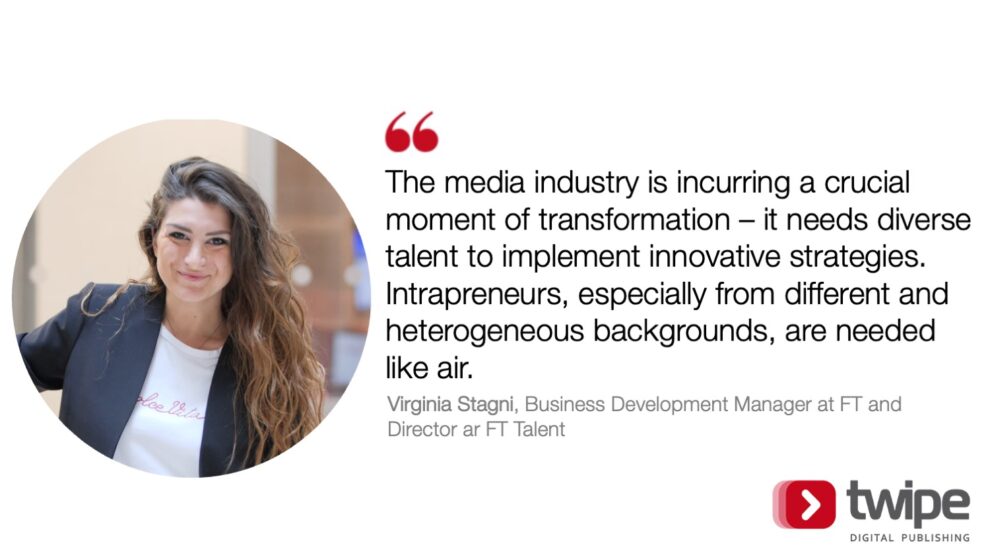Intrapeneurs are the future of news

Written by Virginia Stagni, Business Development Manager at FT and Director at FT Talent
When I joined the FT, I was told that “We need to work with respectful audacity”. This effective line, like an ad, gave a sense of the balanced structure to maintain and suggested the right way to put innovation to work. As it’s turned out, it has become my mantra for working within the news industry.
Finding the balance between tradition and change, and preserving the quality and the integrity of the journalistic activity while adapting to the new rhythm of the network, is not an easy task. If you are a younger talent joining a traditional media organisation, you might feel ‘in between’. This is especially the case for the entrepreneurial minds.
Within British culture, the term ‘adventurer’ was often used as a synonym for entrepreneur. Actually, from the mid-16th century, ‘entrepreneur’ was used in English and French to describe a person who behaves actively, a person who acts. It comes from the French ‘entreprendre’, to ‘undertake’, which originates from the Latin “inter prehendere”, “to seize with the hand”, as physically working on, and mastering something. This is literally, getting your hands dirty.
What is an intrapeneur?
Intrapreneur instead is a very young term. Sustainable business school founder, Gifford Pinchot III, coined the phrase in 1978 and defined it as “dreamers who do”. Intrapreneurs are employees who do for corporations what an entrepreneur does for his or her company or start-up. Being innovators, they act as owners when they approach their projects, and relish taking “hands-on responsibility for creating innovation of any kind, within a business”.
Intrapreneurs are highly needed today to shape the future of our industry, an industry that is so disrupted and constantly evolving. The intrapreneur relies not on a department and his/her expected role, but thinks with a bottom-up approach. They relate to individual employees, taking and believing in an initiative to improve their company as a whole. There is a strong sense of belonging within the intrapreneur community. They strongly feel connected with the culture and the mission of their company, they foster disruption with an entrepreneurial behaviour: knowing the organisational structures but acting at its boundaries, diversifying processes and developing new capabilities, most of the time being contaminated by other industries’ inspirations, they challenge the status quo, putting people and their ideas at the core of change.

Intrapreneurship in action
My first intrapreneur’s experiment has been the FT Talent Challenge at the Financial Times. It meant (and means) working autonomously on this project. Put simply, this has meant building it from scratch and making it relevant for the news company I work for.
FT Talent Challenge is a programme that brings together students and early career professionals (the ‘challengers’) driven by proactivity and curiosity in a competition that takes part in the FT offices or (more recently) virtually. The aim is to challenge the FT ecosystem and assumptions on the future of news and other industries. The talent selected is not the ‘usual’ FT prospect reader (business school students, future consultants or banking professionals, etc.). Instead, we want to reach new groups of potential readers who have never heard of our newspaper or have never connected with financial news. Diversity in terms of social background and studies is what we look for primarily.
With FT Talent we try to attract talented people who may not think about the media industry as a potential workplace. This includes a vast array of portfolios, such as engineers, coders, data scientists – and, people without a specific background but with demonstrable talent. Normally, they look for tech giants and startups as innovation hubs or they have no idea where to start their career. For them, the news industry is not perceived as a potential workplace for these profiles. Yet, the media industry is incurring a crucial moment of transformation – it needs diverse talent to implement innovative strategies. Intrapreneurs, especially from different and heterogeneous backgrounds, are needed like air. Moreover, to truly be a global voice, you need endogenously to have an inclusive voice, representing the different communities and audiences you want to bring whose perspectives you want to hear in.
Dreamers who do
In the chaotic, uncertain, fast-paced contemporary world, journalism must embrace change and adapt. Dreamers Who Do wants to bring you into a journey through the future of journalism, which now more than ever must turn into a trustworthy, reliable, and sense-making entity, representative of our society. Exploring myths and stories from Plato’s Cave to the Black Swan, from Leonardo da Vinci to Giuseppe Garibaldi, from Adriano Olivetti to Steve Jobs, this book is an unconventional invitation for a new generation of intrapreneurs (“entrepreneurs in house”) to take part in the transformational process of one of the most intriguing and impactful industries to work in: the news.
Hear from Virginia at the Digital Growth Summit where she will be leading a Deep Dive Session on How to Engage with Young Readers!

Other Blog Posts

Stay on top of the game
Join our community of industry leaders. Get insights, best practices, case studies, and access to our events.
"(Required)" indicates required fields

